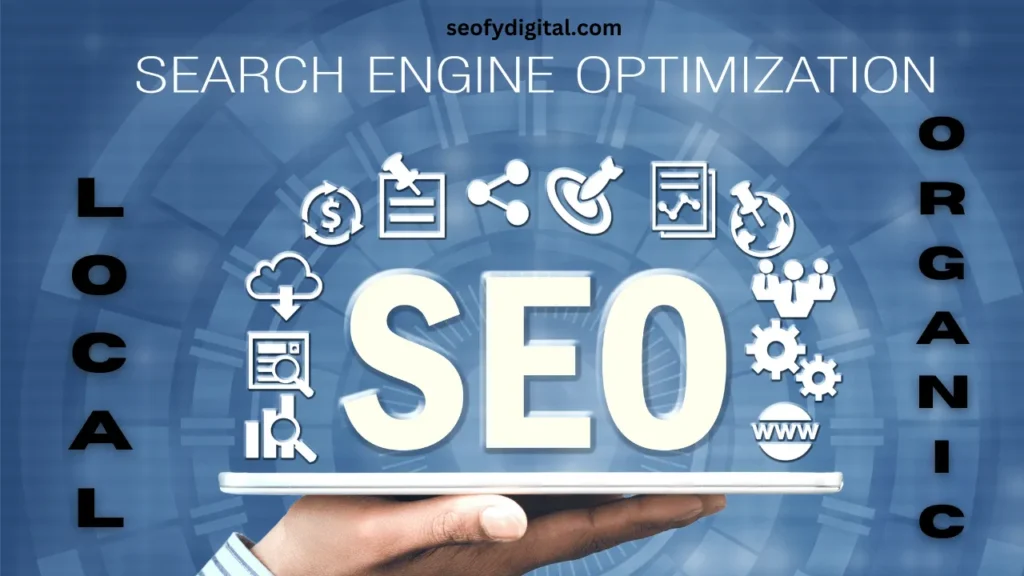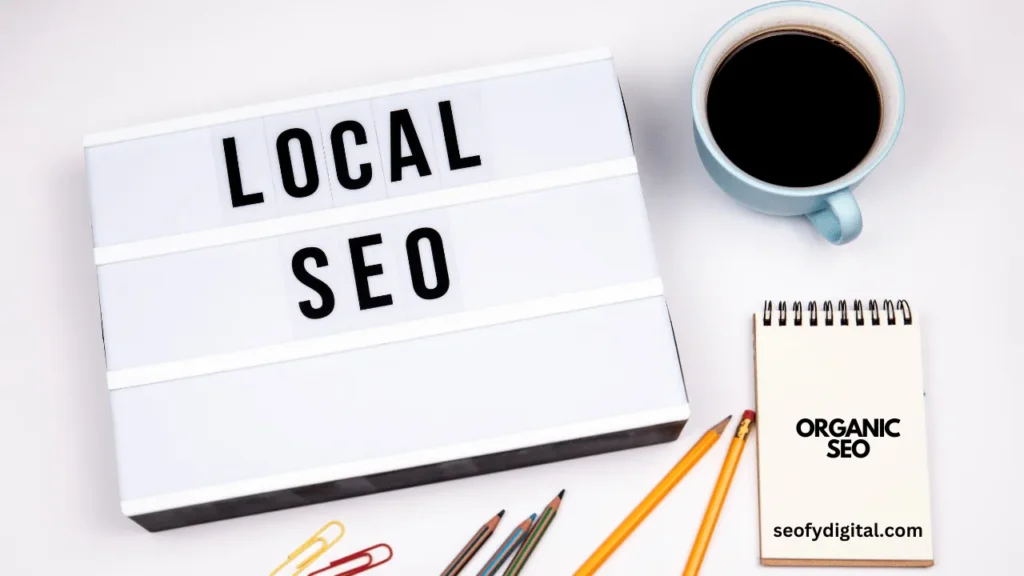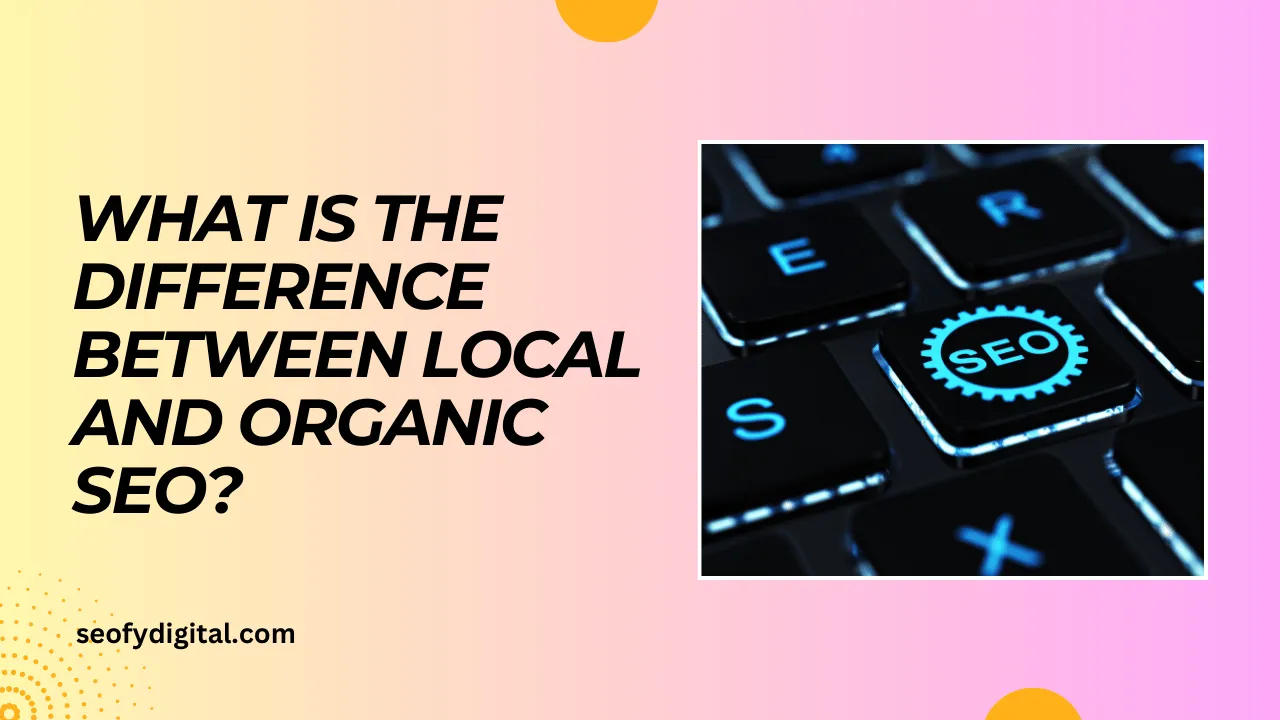In a world where digital presence can make or break a business, understanding the nuances of SEO has never been more important. Imagine having a small business with great products or services but struggling to get it in front of the right people.
That’s where SEO—Search Engine Optimization—steps in, but not all SEO strategies are created equal. Local SEO and Organic SEO are two key approaches, each with unique methods and goals. Choosing the right one can significantly impact your visibility, audience reach, and overall success.
Local SEO and Organic SEO might sound similar, but they target vastly different audiences. While Local SEO focuses on drawing in customers from a specific geographic area, Organic SEO is all about reaching a wider audience based on interests, products, or topics.
Imagine running a café in Boston; your goal would be to appear in search results when people nearby look for coffee shops. In contrast, a blog on coffee trends would need Organic SEO to rank for broader keywords across locations, attracting coffee enthusiasts everywhere.
By understanding these two types of SEO, you can better align your digital strategy with your business goals. In this article, we’ll break down the core concepts, target audiences, and ranking factors that make each SEO type unique.
We’ll also discuss the best practices you need to follow to optimize your website for either or both. If you’re ready to take your SEO knowledge to the next level, read on to learn which SEO strategy will bring you the visibility you need.

Contents
- 1 Core Concepts
- 2 Target Audience
- 3 Search Engine Algorithms
- 4 Key Ranking Factors
- 5 Best Practices
- 6 Conclusion
- 7 FAQs
- 7.1 1. What is the main difference between Local SEO and Organic SEO?
- 7.2 2. Why is Google My Business important for Local SEO?
- 7.3 3. Do online-only businesses need Local SEO?
- 7.4 4. Can a business use both Local and Organic SEO?
- 7.5 5. How does keyword research differ between Local and Organic SEO?
- 7.6 6. What role do reviews play in Local SEO?
Core Concepts
Local SEO: Local SEO is all about increasing visibility in a specific geographic area. This strategy involves setting up a Google My Business profile, which allows businesses to appear in local search results and Google Maps.
Local SEO also relies on local citations—mentions of your business name, address, and phone number on other websites—and backlinks from local sites. These elements help search engines verify your business’s location and relevance within that area.
Organic SEO: On the other hand, Organic SEO targets a wider audience without focusing on location. It aims to rank websites higher on the search engine results pages (SERPs) by using on-page and off-page SEO techniques.
This includes creating high-quality, relevant content, optimizing keywords, and focusing on technical SEO elements like site speed and mobile-friendliness. Unlike Local SEO, Organic SEO emphasizes broader keywords that align with users’ interests, not just their location.
Target Audience
Local SEO: The target audience for Local SEO includes people within a certain geographic location who are looking for services nearby. For example, if someone searches for “pizza near me,” Local SEO ensures that local pizza restaurants appear in the results.
This strategy is highly effective for brick-and-mortar businesses like restaurants, gyms, or retail shops where proximity is a priority.
Organic SEO: Organic SEO is aimed at a broader, topic-specific audience rather than a geographically confined one. It’s ideal for businesses that operate online or serve a global customer base, like e-commerce websites or blogs.
In this case, the goal is to understand the user’s intent and create content that meets their needs, without restricting to a particular location.

Search Engine Algorithms
Local SEO: Local SEO relies heavily on Google’s local ranking factors: proximity, relevance, and prominence. For example, the closer a business is to a searcher’s location, the more likely it is to appear in local search results.
Google My Business plays a crucial role here, as Google uses it to determine how trustworthy and popular your business is in the local area.
Organic SEO: Organic SEO depends on Google’s core algorithms, which evaluate factors like content quality, backlinks, and user experience. Unlike Local SEO, Organic SEO doesn’t consider the user’s location. Instead, it focuses on keyword relevance and how well your website aligns with what the user is looking for.
Keyword research is essential to Organic SEO, helping websites rank for the most relevant terms.
Key Ranking Factors
Local SEO: Local SEO ranking factors include:
- Google My Business optimization: Ensure your profile is complete and up-to-date.
- Local citations: Consistent NAP (Name, Address, Phone) information across directories.
- Local backlinks: Links from locally relevant sites boost credibility.
- Online reviews: Positive reviews improve local rankings.
Organic SEO: Organic SEO factors include:
- High-quality content: Informative, engaging content that addresses user needs.
- Keyword optimization: Keywords should naturally fit into content and metadata.
- Backlinks: Links from authoritative sites improve credibility and rankings.
- Technical SEO: Elements like page speed, mobile responsiveness, and structured data.
- User experience: Easy navigation and low bounce rates are crucial.
Best Practices
Local SEO:
- Set up a Google My Business profile and keep it updated with accurate information.
- Encourage positive reviews to build trust and improve visibility.
- Build local citations and backlinks by collaborating with local websites and directories.
- Optimize content with location-specific keywords to help users find you easily.
Organic SEO:
- Create high-quality content that answers questions, solves problems, or provides value.
- Conduct keyword research to find the most relevant and valuable terms for your audience.
- Build high-quality backlinks from reputable websites.
- Optimize for technical SEO by ensuring fast load times, mobile-friendliness, and proper metadata.
- Enhance user experience with intuitive site design and clear navigation paths.
Conclusion
Both Local and Organic SEO play vital roles in helping businesses connect with their audience. Local SEO zeroes in on customers close by, making it ideal for brick-and-mortar businesses, while Organic SEO caters to a broader range, focusing on topic-related search intent.
Combining these strategies can create a more comprehensive online presence, especially if you run a business that has both local and online aspects. As SEO continues to evolve with voice search, AI, and personalized search, these strategies are becoming more intertwined.
Adopting a hybrid approach can help future-proof your SEO efforts, positioning your business well in both local and broader searches. Whether you’re a local business or an online brand, implementing these best practices is key to reaching your audience effectively and staying ahead of the competition.
FAQs
1. What is the main difference between Local SEO and Organic SEO?
Local SEO focuses on specific geographic areas, while Organic SEO targets broader keywords.
2. Why is Google My Business important for Local SEO?
Google My Business helps businesses appear in local searches and provides essential information like hours and location.
3. Do online-only businesses need Local SEO?
Generally, no, but they might benefit from it if they target a specific area.
4. Can a business use both Local and Organic SEO?
Yes, many businesses benefit from a hybrid approach.
5. How does keyword research differ between Local and Organic SEO?
Local SEO uses location-based keywords, while Organic SEO focuses on topic relevance.
6. What role do reviews play in Local SEO?
Reviews boost credibility and visibility in local search results.








